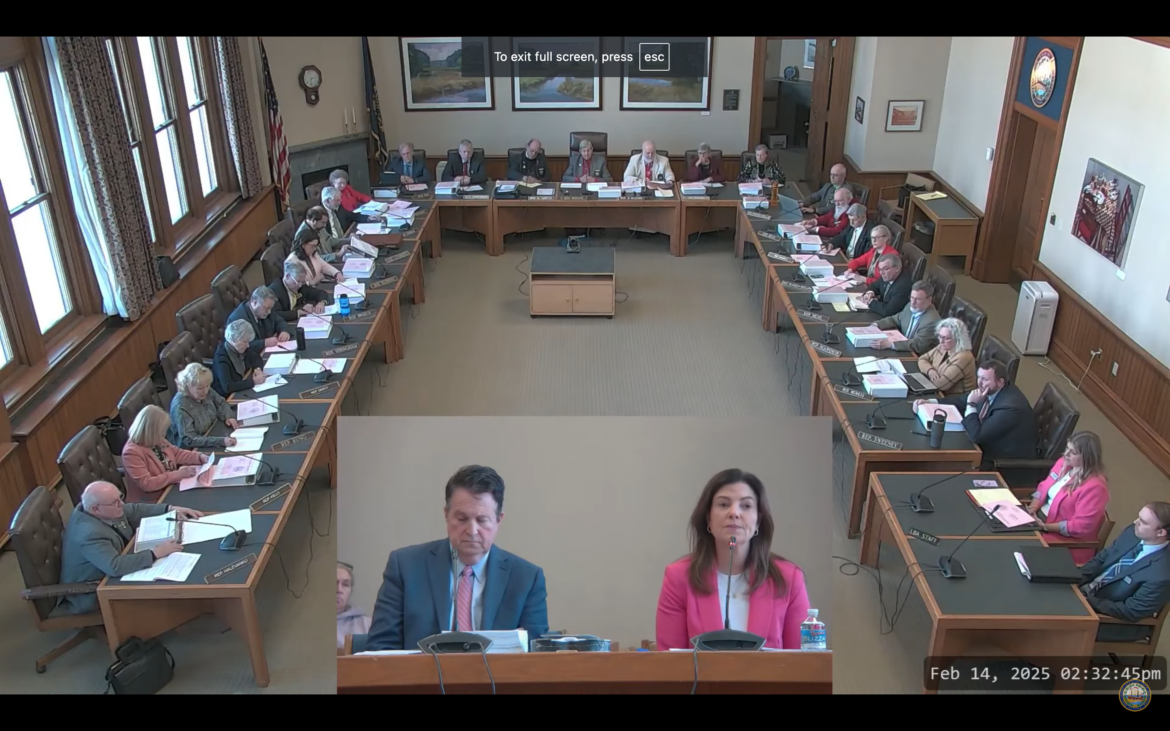By GARRY RAYNO, InDepthNH.org
CONCORD — The state is projected to end the current biennium with an $81 million deficit and an operational deficit of $158 million for the 2025 fiscal year.
The budget Gov. Kelly Ayotte proposed this week would tap the state rainy day fund for the $81 million to cover the deficit lowering the total in the state’s saving account from $292.5 million, to $211.5 million.
Ayotte met with members of the House Finance Committee Friday to lay out her budget plan and answer questions from committee members.
She was asked about measures she is taking to reduce spending this fiscal year and she touted the hiring freeze she instituted and said she is watching the contracts and grants that come before the Executive Council for greater efficiencies or if they are really needed.
Other members were concerned about the governor’s estimates for business tax returns.
House Finance Committee Chair Rep. Ken Weyler, R-Kingston, told the governor the committee has to work with the revenue estimates from the House Ways and Means Committee and those figures are lower than the ones included in the governor’s budget proposal.
While Ways and Means has yet to finalize its figures, its current estimate for business taxes are $2.16 billion for the next biennium, which is $300 million lower than the governor’s estimates.
“We are optimistic given the economic condition in New Hampshire that business tax revenues will rebound.” Ayotte told the committee, “we have a strong economy,” noting the state is outperforming its neighbors in job growth and new start ups.
The governor’s revenue projections also include additional revenue from transitioning from historic horse racing at charity casinos to slot machines, although that provision has yet to pass the legislature.
The transition is also expected to increase the money going into the Education Trust Fund over prior years.
Under questioning from Mary Jane Wallner, D-Concord, Ayotte said there are eight layoffs in her budget, four in the Department of Administrative Services for those involved in a project that is completed and four in the Department of Information Technology.
The governor said she included the pay raise in the negotiated contract, but not one beyond that in her budget.
The 12 percent pay increase over the two years negotiated by the Sununu administration paid for that increase with surplus funds, Ayotte said, but that put an undue burden on fiscal 26 and 27.
The current budget did not put any money into the rainy day fund or account for the potential drop in revenue the state is experiencing, and included $100 million in off budget spending, she said.
“The result is there is no safety margin in the budget,” Ayotte said.
The governor also told committee members she disagrees with the Judicial branch’s proposal to meet its requested 4 percent reduction by closing circuit courts in Candia and Claremont and halting jury trials for two months in superior courts and reducing court security.
Committee member Rep. Karen Ebel, D-New London, raised the issue with Ayotte, also noting the court administrators told her subcommittee the filing of 1,375 superior court cases associated with the abuse of children at the Youth Development Center requires more staffing.
Those responses to the requested cut really does affect the administration of justice, Ebel said.
Ayotte noted the request for a 4 percent cut comes at a time when the court’s budget is at a historic high. She said she urged them to explore combining administrative staff for the circuit and superior courts for savings rather than cut jury trials.
“I can only urge them,” Ayotte said. “They are a separate branch of government.”
James Jerry, the governor’s director of policy and finance, noted the figure they were given with the 4 percent reduction, $116 million, is more than the branch is projected to spend this fiscal year.
“There are ways to get there without some of the draconian measures they propose,” he told the committee.
Rep. Kate Murray, D-New Castle, asked Ayotte about her proposal to remove any income cap for parents of children in public schools for the Education Freedom Account program.
She said with the belt-tightening and focus on fiscal responsibility for this budget, how as governor could she support expanding a program that has no guardrails, has always been way over budget, and has no accountability.
Ayotte noted “we are making a historic investment in public education. I am a product of public education and I believe very strongly in it.”
But she said not every child finds success in a public school setting, and the program would allow parents to find the best educational setting for their child.
“It is a very worthy investment as a state,” she said.
Ayotte gave a shortened version of her budget address the day before touting increasing state aid for special education services by 50 percent, protecting the most vulnerable with $1 billion in spending for developmentally disabled services and no wait list, increased funds for community mental health, $33 million to begin addressing the retirement issue for Group 2, or first responders, drug interdiction and protecting the state’s northern board, and streamlining the permitting process for new housing to address what she called the state’s most critical issue.
The House Finance Committee will work on its budget proposal and has a deadline of April 3 for the House to act on its plan.
Garry Rayno may be reached at garry.rayno@yahoo.com.





